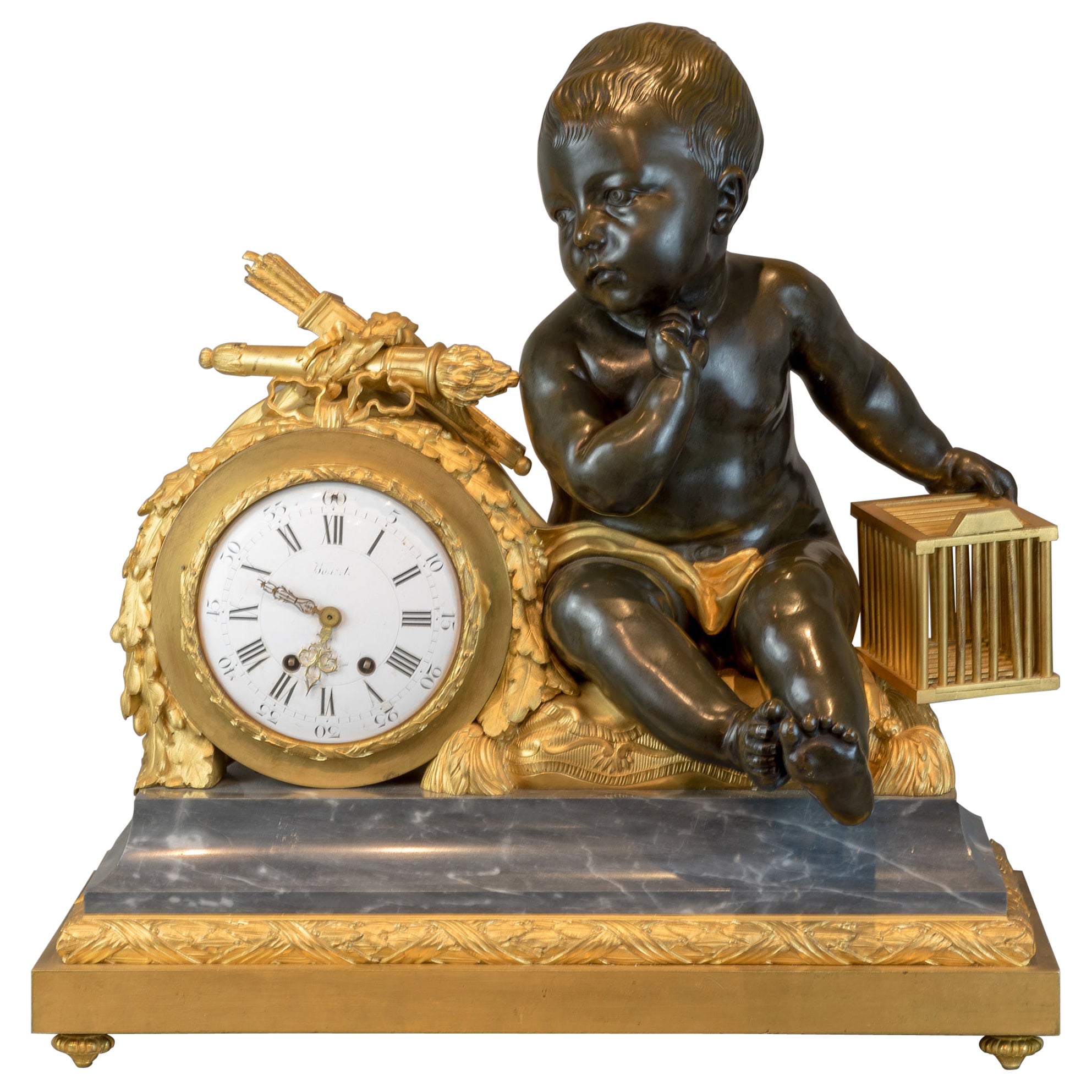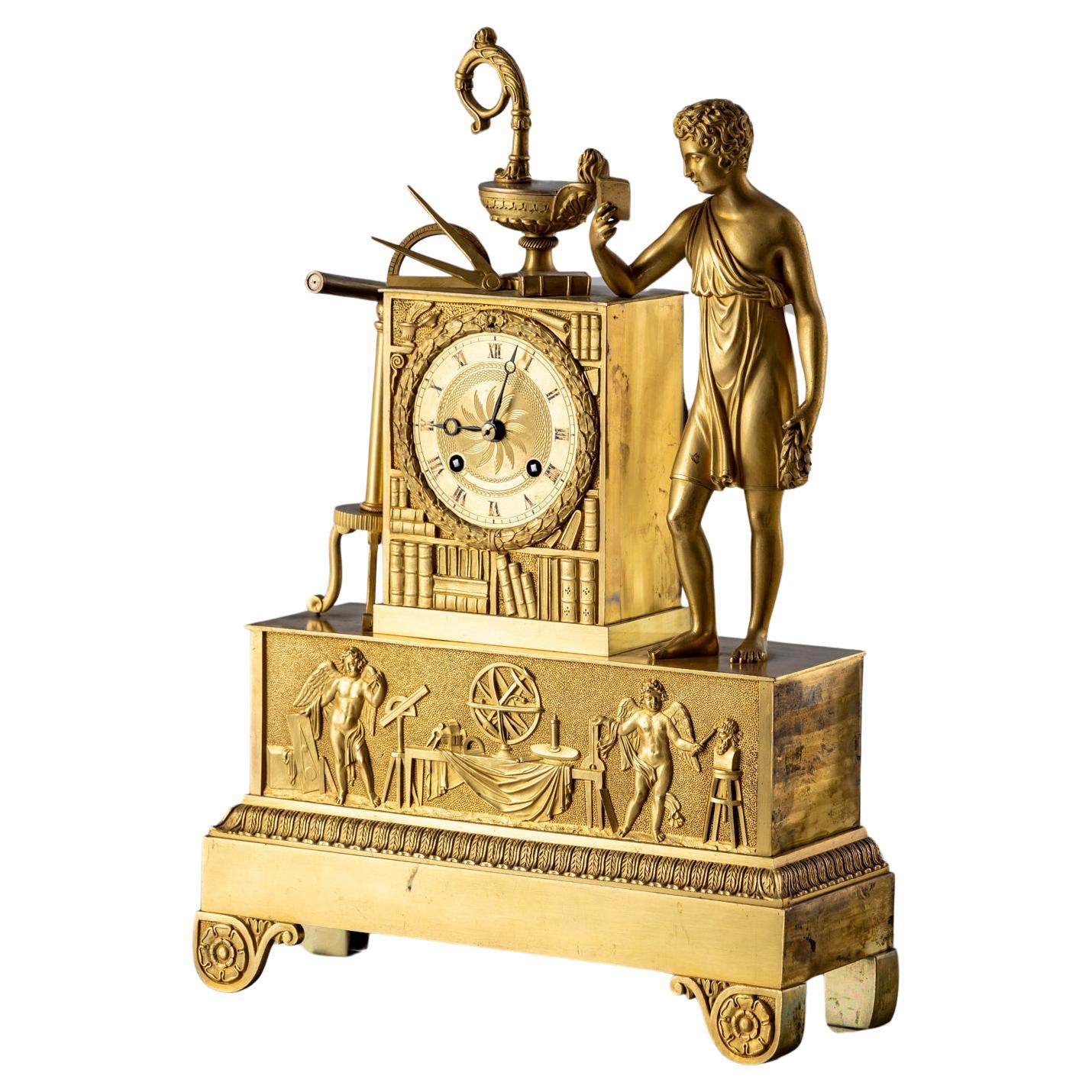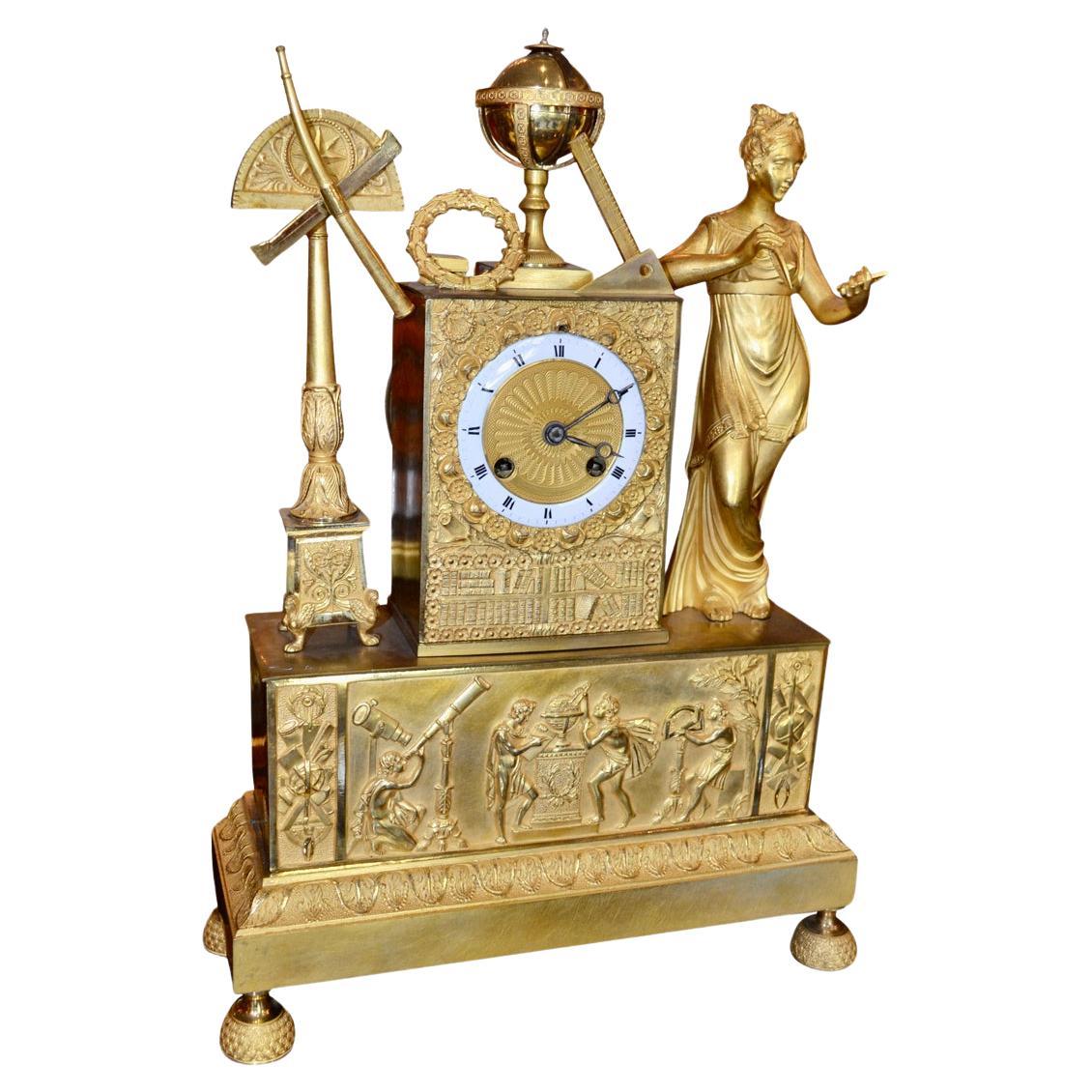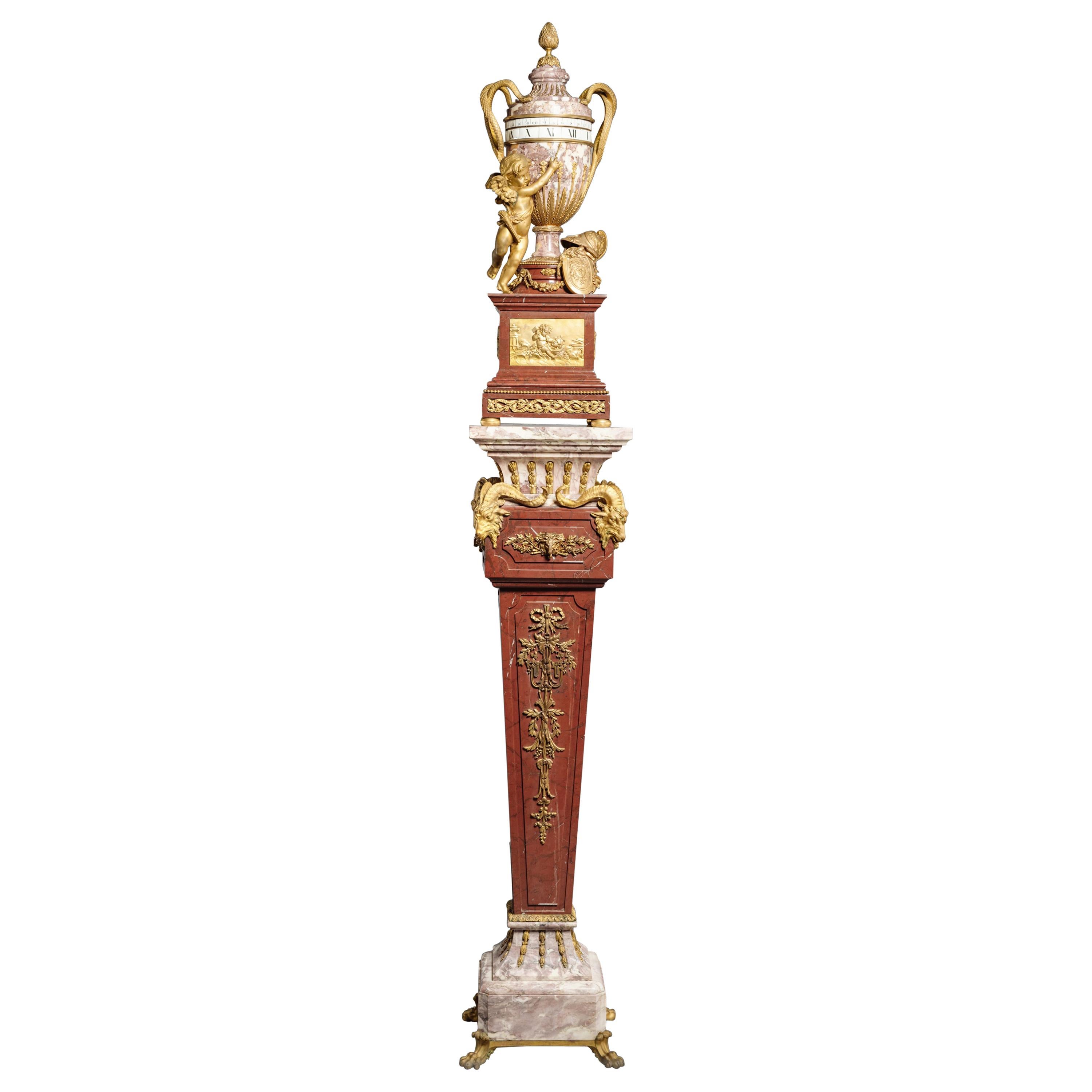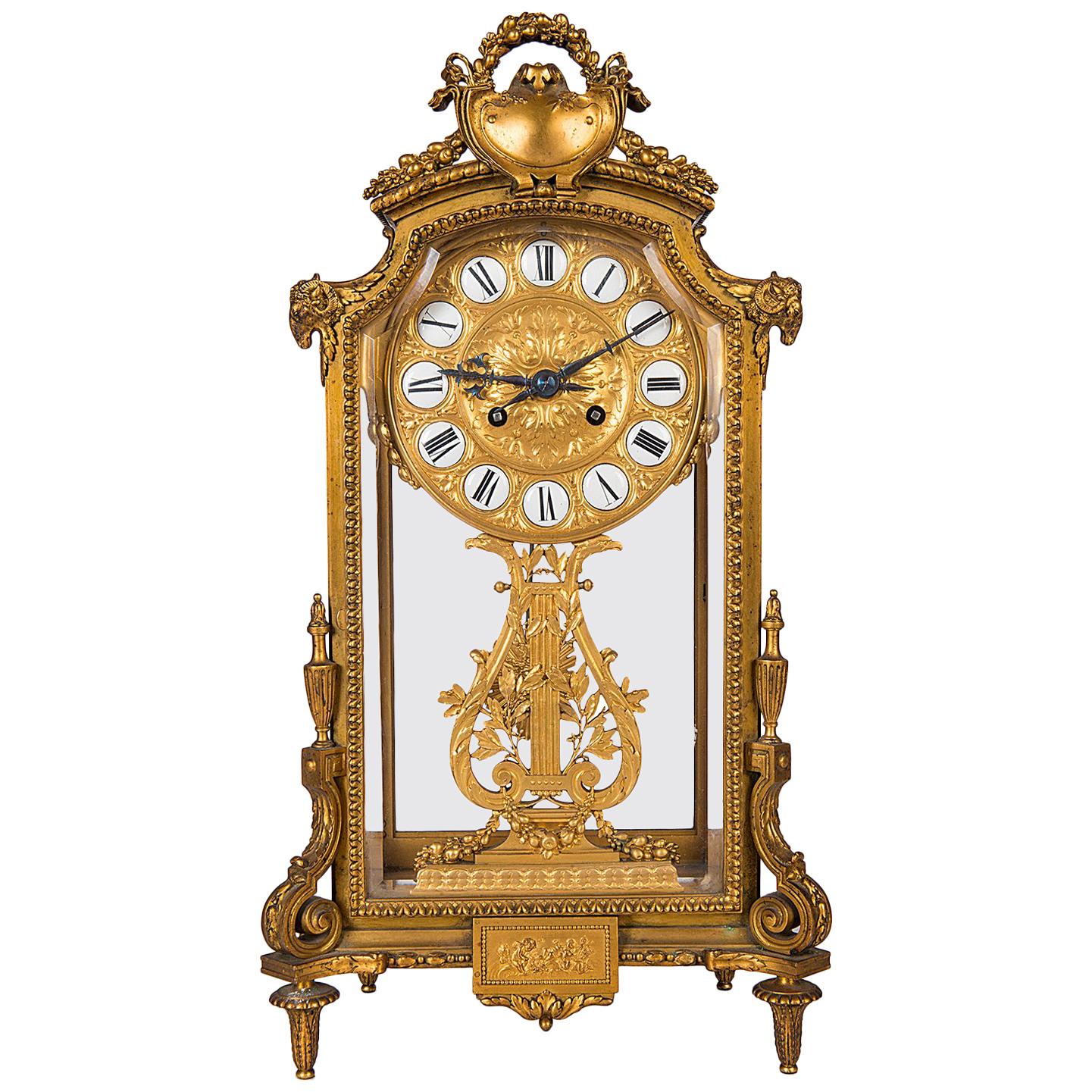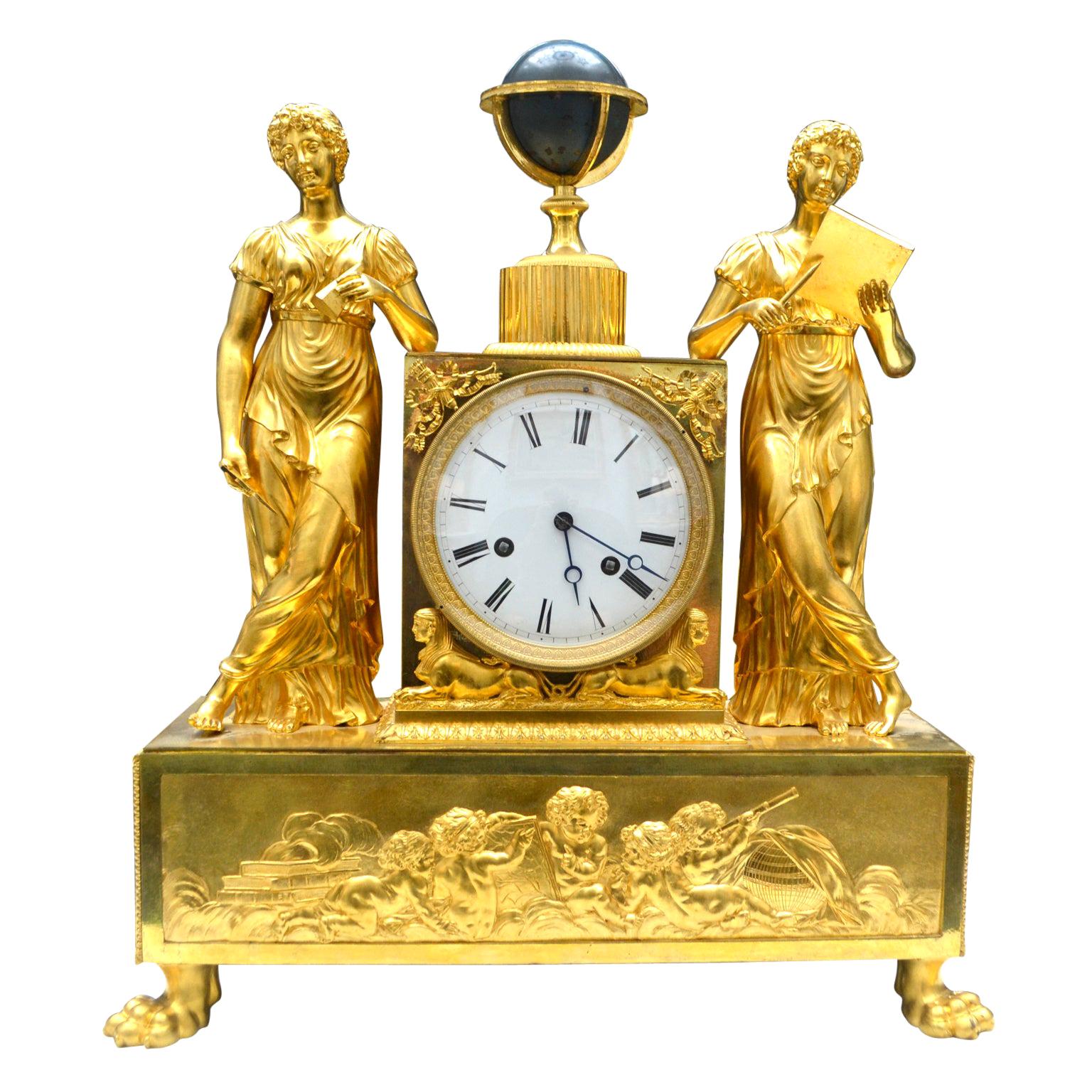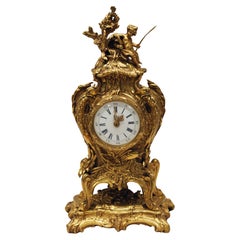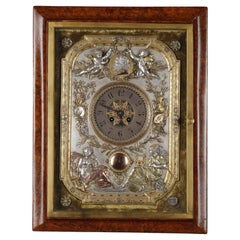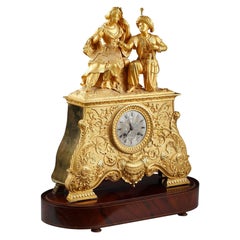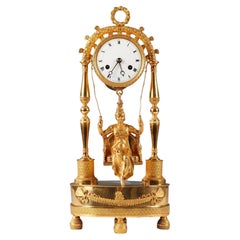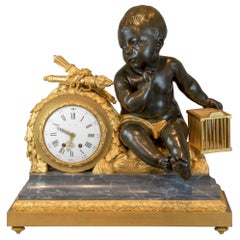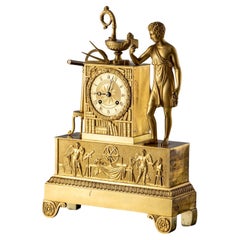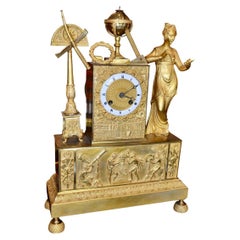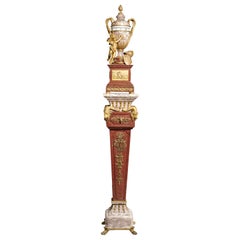Items Similar to A-E Beurdeley, « The Coronation of Science » Clock, France, circa 1890
Want more images or videos?
Request additional images or videos from the seller
1 of 14
A-E Beurdeley, « The Coronation of Science » Clock, France, circa 1890
$45,136.95
£33,640.93
€38,500
CA$62,132.68
A$70,490.86
CHF 36,911.46
MX$869,668.69
NOK 457,694.45
SEK 437,925.77
DKK 292,917.33
Shipping
Retrieving quote...The 1stDibs Promise:
Authenticity Guarantee,
Money-Back Guarantee,
24-Hour Cancellation
About the Item
Signed on the dial A. Beurdeley Paris
Mechanism signed J LEFEBVRE FILS PARIS
Rare Louis XVI style clock in mercury gilded and patinated chiseled bronze and white marble. In the form of an arched pediment, it is decorated with four Cupids, two carrying a garland of flowers highlighting the dial, and two others symbolizing the coronation of Science. The molded base in white marble, with a double recess, is decorated with a ribboned torus, a frieze of ribboned oak leaves and interlacing, and rests on six flattened ball feet.
Related work :
In 1774, the bronze-caster Robert Osmond (1711-1789) designed a first model known as “architectural drawing” illustrating The Coronation of Science. Also called The Children of France, it is decorated with a putti crowning a young girl drawing with a compass and delivered to Versailles by Lépine, clockmaker to the King since 1762, for the apartment of Madame Royale in the Princes’ Wing, on December 28, 1778. (see photo attached)
This clock is described in the inventory of Versailles clocks from 1787, in the Clock Cabinet of the King’s apartments at Versailles : « 1. Une pendule de cheminée à chapiteau en bronze doré d’or moulu portée sur socle de marbre noir garni de frises à a grecque, les ornements de cette boette sont désignés par deux enfants assis sur l’entablement portant le chapiteau en forme de support, surmontée de deux génies dont l’un est couronné par l’autre, h. de 19 po. Sur 19 po ? 9 l. de large, par Charles Le Roy »
This clock is inspired by the plate 77 of Osmond’s collection of drawings entitled : Pièce à portail grande Architecture avec 1 génie, vers 1775 (see photo attached)
Another version of this clock by the bronze-caster Osmond, described as a cartonnier clock and closer to the model executed by Beurdeley, and reproduced in Vergoldete Bronzen P. Pröschel and H. Ottomeyer, Munich 1986, vol. I, page 229, fig. 4. 1. 9., is kept at the Musée Jacquemart André. (see photo attached)
Biography :
In 1875, Alfred-Emmanuel Beurdeley (1847-1919) was at first assistant to and later succeeded his father Louis-Auguste Beurdeley, one of the main cabinet-makers of the Second Empire, specialising in 18th century furniture. Louis-Auguste was the star whenever he exhibited and was “most favored by the royal and imperial families”. Although he produced the same kind of works of art as his father, Alfred Beurdeley was also a very well-known art collector and a skilled bronze sculptor. With Dasson, Grohé, Sauvresy and Fourdinois, the most famous artists of the period, he took part in the 1878 Universal Exhibition and won the gold medal. Crowned with glory he went so far as to open a shop in New York. His participation in the 1883 Amsterdam Universal Exhibition drew considerable attention to his work and “Alfred Beurdeley, Fabricant de bronzes d’art” was then awarded the Ordre National de la Legion d’Honneur, France’s hightest official mark of recognition. He thus won the respect of both the government and contemporary art critics. His last presentation was during the 1889 Universal and International Exhibition, when the director of the Exhibition wrote in his report : “The talent of Mr Beurdeley is self evident when one inspects his furniture.”
- Creator:Emmanuel-Alfred Beurdeley (Maker)
- Dimensions:Height: 21.66 in (55 cm)Width: 23.04 in (58.5 cm)Depth: 7.49 in (19 cm)
- Style:Louis XVI (In the Style Of)
- Materials and Techniques:
- Place of Origin:
- Period:
- Date of Manufacture:circa 1890
- Condition:Wear consistent with age and use.
- Seller Location:PARIS, FR
- Reference Number:1stDibs: LU3860345436812
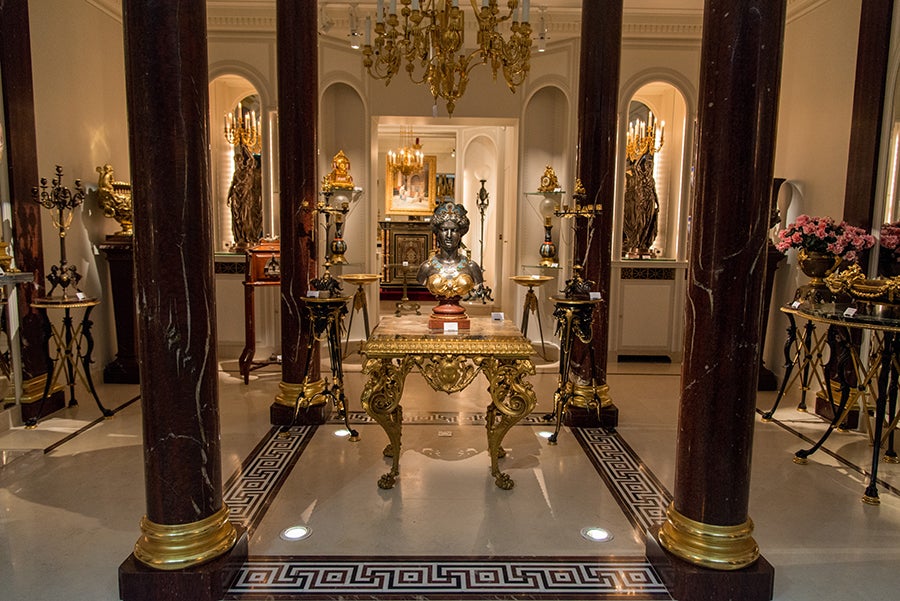
About the Seller
4.9
Gold Seller
Premium sellers maintaining a 4.3+ rating and 24-hour response times
Established in 1997
1stDibs seller since 2018
85 sales on 1stDibs
Typical response time: 2 hours
Associations
International Confederation of Art and Antique Dealers' Associations
- ShippingRetrieving quote...Shipping from: PARIS, France
- Return Policy
Authenticity Guarantee
In the unlikely event there’s an issue with an item’s authenticity, contact us within 1 year for a full refund. DetailsMoney-Back Guarantee
If your item is not as described, is damaged in transit, or does not arrive, contact us within 7 days for a full refund. Details24-Hour Cancellation
You have a 24-hour grace period in which to reconsider your purchase, with no questions asked.Vetted Professional Sellers
Our world-class sellers must adhere to strict standards for service and quality, maintaining the integrity of our listings.Price-Match Guarantee
If you find that a seller listed the same item for a lower price elsewhere, we’ll match it.Trusted Global Delivery
Our best-in-class carrier network provides specialized shipping options worldwide, including custom delivery.More From This Seller
View All"The Source" Gilt bronze Clock attr. to L. Messagé & F.Linke, France, circa 1890
By François Linke
Located in PARIS, FR
Charming clock in the shape of a Rocaille-inspired cartel in chiseled and gilded bronze. Scalloped marine-inspired decor representing a trophy with oars, dolphins, reeds and flowers ...
Category
Antique 1890s French Rococo Revival Table Clocks and Desk Clocks
Materials
Bronze, Enamel
Easel Clock, Signed Elkington & Co, England, Circa 1890
By Elkington & Co.
Located in PARIS, FR
Signed Elkington & Co
Numbered Rd 92173
Beautiful rectangular table clock executed in gilded and silvered electrotyped metal, decorated in relief with butterflies, music instrume...
Category
Antique 1890s English Table Clocks and Desk Clocks
Materials
Metal
$17,351 Sale Price / item
20% Off
Free Shipping
Leila and the Giaour Gilded Bronze Clock, France, Circa 1830
Located in PARIS, FR
Dial signed Polti Frères
Measures: With base or glass: Height 61 cm (24 in.), width 51,5 cm (20.3 in.), depth 23.5 cm (9,2 in.)
Without base: Height 52 cm (20,5 in.), width 42 cm (16.5 in.), depth 12.5 cm (4.9 in.)
Important philhellenic clock in burnished and amati gilded bronze, finely chiseled, representing on the terrace a couple elegantly dressed in "the turkish style", and richly decorated with foliage, scrolls and flowers. The feet, decorated with water leaves, rest on an oval wooden base covered with a globe.
The theme of the clock comes from The Giaour, a fragment of a Turkish Tale, an English poem by Lord Byron published in may 1813 which tells the thwarted love of a Venetian, the Giaour – term by which the Turks designate infidels and especially Christians – and of Leila, a slave belonging to Hassan’s seraglio, military leader of a Turkish province. The betrayal of Leila discovered, she will be thrown into the sea and her lover will avenge her by killing Hassan, then taking refuge in a monastery.
Symbol of prestige and modernity, the decorative clocks are a reflection of the taste of the era of a wealthy bourgeoisie and may be the subject of diplomatic gifts or between individuals.
Beyond the purely decorative aspect of such objects, watchmaking in the 19th century is part of a subtle mix of political, historical and literary references.
This philhellenic movement converning the West finds a particular echo in France, one of the countries with the United Kingdom and Russia having suported the Greeks during their war of independance (1821-1830) to free oneself from the grip of the Ottoman Empire. Many clocks...
Category
Antique 1830s French Mantel Clocks
Materials
Bronze
$12,661 Sale Price
55% Off
Ormolu Clock "with a Swing", France, circa 1820
Located in PARIS, FR
Very fine floral and decorated Restauration period ormolu clock, figuring two baluster columns joint together by a floral arch, and topped by a crown of roses. Roman numbers indicate...
Category
Antique 1820s French Restauration Mantel Clocks
Materials
Bronze
Important Five Pieces Marble and Gilded Bronze Clock Set, France, Circa 1860
By Henri Picard
Located in PARIS, FR
Marked on the dial Furet & Bon, Hrs du Roy, à Paris
Measures: Clock – Height 98 cm (38 1/2 in.), width 70 cm (27 1/2 in.), depth 25 cm (9 3/4 in.)
Candelabra – Height 116 cm (45 ...
Category
Antique 1860s French Louis XVI Mantel Clocks
Materials
Marble, Bronze
« The Musician » Japanese style Clock attr. to L'Escalier de Cristal, FR, c.1890
By L'Escalier de Cristal
Located in PARIS, FR
Amusing bronze with double patina and porcelain clock in the shape of a covered jar.
This clock, with a dial with Arabic numerals decorated in its center with a seated lute player, i...
Category
Antique 1890s French Japonisme Mantel Clocks
Materials
Bronze
You May Also Like
Gilt Bronze and Marble Figural Clock by Beurdeley
By Emmanuel-Alfred Beurdeley
Located in New York, NY
The mantel clock with a seated putto and birdcage.
Maker: Alfred-Emmanuel Beurdeley (French, 1847-1919)
Origin: French
Date: 19th century
Dimension: 26 in. x 13 1/2 in.
Category
Antique Late 19th Century French Napoleon III Mantel Clocks
Materials
Bronze
Mantel Clock, Allegory of the Sciences, France around 1830
Located in Greding, DE
Fireplace clock made of fire-gilt bronze with a rectangular base with a relief depicting winged putti with the attributes of the various sciences. Above it is a clock case in the sha...
Category
Antique 1830s French Mantel Clocks
Materials
Bronze
French Empire Gilt Bronze Allegorical Clock of the Astronomical Sciences
Located in Vancouver, British Columbia
A fine example of a period French Empire mantle clock in finely chased and gilded bronze made in France in the first quarter of the 19thC. One of the Greek muses with a star atop h...
Category
Antique Early 19th Century French Empire Mantel Clocks
Materials
Bronze
Louis XVI Style Annular Dial Clock in the Manner of Lepaute, French, circa 1890
By Jean-André Lepaute 1
Located in Brighton, West Sussex
A rare Louis XVI style gilt-bronze mounted marble annular dial pedestal clock in the manner of Jean-André and Jean-Baptiste Lepaute, attributed to Dufaud, Paris.
The eight-day twin-train movement with circular plates and lateral lever escapement on a gilt platform, with cut bimetallic compensation balance, flat balance spring and index regulator, striking the hours and half-hours on a bell.
The dial having twin revolving chapter rings with white enamel cartouches with Roman numerals on a revolving ring, with a revolving minute ring above with Arabic numerals, the time indicated by Cupid pointing with an arrow.
This fine annular dial or ‘cercles tournants’ clock...
Category
Antique Late 19th Century French Louis XVI More Clocks
Materials
Marble, Bronze
Barbedienne French Mantel Clock, circa 1890
By F. Barbedienne Foundry
Located in Brighton, Sussex
A fine quality Louis XVI style French gilded ormolu mantel clock, signed Barbedienne. Having shield and foliate decoration to the top, white enamel roman numerals, a lyre shaped pend...
Category
Antique Late 19th Century French Louis XIV Mantel Clocks
Materials
Ormolu
French Empire Gilt Bronze Allegorical Clock Depicting the Astronomical Sciences
Located in Vancouver, British Columbia
A fine early 19th century French Empire gilt bronze clock representing an allegory of astronomy; featuring two classically draped maide...
Category
Antique Early 19th Century French Empire Mantel Clocks
Materials
Bronze
$7,200 Sale Price
20% Off
